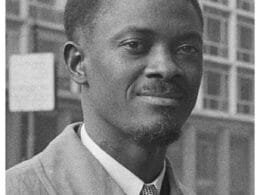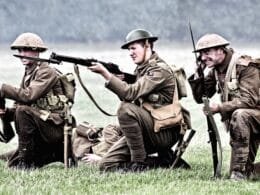The Memoir
Yevgeni Nikolaev’s memoir, “Red Army Sniper: A Memoir of the Eastern Front in World War II,” offers a poignant and personal account of one of the most brutal theaters of conflict during the Second World War. The Eastern Front was characterized by intense warfare, with clashes between the Soviet Union and Nazi Germany defining the course of the war. Nikolaev’s narrative not only captures the harrowing realities of combat but also the profound psychological and emotional impacts that such experiences have on individuals. The memoir serves as a crucial personal testimony within the broader historical context of the Eastern Front, where millions fought valiantly amid dire conditions.
Nikolaev’s enlistment in the Red Army was fueled by a complex mix of patriotism and a sense of duty toward his homeland. At the time, the Soviet Union was under threat, and the call to arms resonated deeply with young men like Nikolaev, who yearned to defend their country against the looming dangers posed by the Axis powers. The memoir highlights his initial motivations, emphasizing the fervent desire to contribute to the war efforts and protect the future of Soviet society. This context is essential for understanding the transformation he undergoes as he faces the grim realities of war.
Moreover, the act of sharing his experiences through this memoir serves a dual purpose: it provides a historical account worthy of reflection for future generations while simultaneously functioning as a cathartic outlet for Nikolaev. By articulating the horrors he witnessed and the moral dilemmas he faced, he aims to honor his comrades and convey the complex nature of warfare. In doing so, “Red Army Sniper” stands as a significant contribution to the literature on World War II, offering insights into the human condition amidst the chaos of battle.
Background of Yevgeni Nikolaev
Yevgeni Nikolaev was born into a tumultuous era of Russian history, a period marked by significant social and political upheaval. Growing up in the early 20th century, he experienced firsthand the consequences of the Russian Revolution of 1917, which fundamentally altered the landscape of his childhood. Born into a modest family, Yevgeni’s early life was characterized by poverty and hardship, which imbued him with resilience and a strong work ethic. His formative years were spent in a small village, where the simplicity of rural life stood in stark contrast to the complexities of the broader socio-political context of the time.
Education played a pivotal role in shaping Yevgeni’s worldview and skills. He attended local schools that, despite their limited resources, provided him with a basic education. It was during this time that he developed an interest in marksmanship, finding a natural affinity for the skill that would ultimately define his military career. His early experiences of rifle shooting began to evolve from a childhood pastime into something more essential, foreshadowing his later endeavors as a sniper during World War II. These formative experiences were crucial in fostering a sense of discipline and focus, valuable traits that would later serve him on the battlefield.
The societal environment during his youth was also influential. The tension between different social classes, the impact of war on communities, and the rise of communist ideology played significant roles in shaping Nikolaev’s character. The harsh realities of life instilled in him a profound understanding of survival, strategy, and the complexities of human nature. These early life experiences not only reflected the broader narrative of wartime Russia but also crafted the ethos that guided Yevgeni Nikolaev through the chaos of the Eastern Front, preparing him for the trials he would face as a soldier and sniper in World War II.
Life on the Eastern Front
The Eastern Front during World War II created an environment characterized by brutal living conditions and fierce combat. Soldiers found themselves battling against not only an organized enemy force but also the severe climate that defined the region. Winters were particularly harsh, with temperatures often plunging to dangerously low levels. These extreme weather conditions compounded the difficulties faced by soldiers, rendering inadequate clothing and shelter nearly fatal for many. The concrete hardships of life on the Eastern Front are illustrated through stories of frostbite and exposure, underscoring the physical toll exacted on those who fought.
Alongside the environmental challenges, soldiers encountered persistent shortages of basic supplies. Rations were limited, and the scarcity of food led to malnutrition and weakened states among troops. As the war dragged on, the supply lines frequently faltered, resulting in diminished access to ammunition, medical supplies, and essential provisions. This deprivation significantly impacted military morale, as hunger and fatigue began to erode the resolve of even the most stalwart soldiers. In moments of dire need, resourcefulness became crucial, fostering a gritty resilience; some soldiers improvised ways to secure sustenance, often forming makeshift rations from whatever could be salvaged.
Amidst the chaos and suffering, soldiers on the Eastern Front developed profound bonds of camaraderie. The shared experience of facing adversity forged unbreakable connections, as individuals relied on one another for emotional support and practical assistance. These friendships transcended the brutality of war, providing a semblance of normalcy and humanity in a dehumanizing environment. Whether it was sharing stories from home or standing shoulder to shoulder in battle, these relationships played a vital role in sustaining morale. In reflecting on the Eastern Front, one cannot overlook the complex interplay of hardship, resilience, and camaraderie that defined life for those who served there.
Training as a Sniper
The journey to becoming a proficient sniper during World War II was neither simple nor straightforward. For Yevgeni Nikolaev, the training process was marked by intense physical and mental preparation, designed to forge a soldier capable of operating alone under extreme conditions. At the onset of his training, Yevgeni was introduced to the fundamentals of marksmanship, where he learned to handle various firearms with precision. The training regimen included long hours of target practice, aimed at honing his shooting skills at varying distances, essential for an effective sniper.
In addition to marksmanship, Yevgeni’s training encompassed extensive instruction in stealth and camouflage tactics. The necessity of remaining unseen by the enemy was drilled into every aspiring sniper. Yevgeni was taught how to blend into his surroundings, using natural cover to evade detection. This was complemented by lessons in fieldcraft, which emphasized the importance of situational awareness and the ability to adapt quickly to the unpredictable dynamics of the battlefield.
A significant challenge during this period was the psychological toll that came with the training. Snipers were not merely soldiers; they were tasked with making life-and-death decisions while often operating in isolation. Yevgeni underwent rigorous mental conditioning, designed to prepare him for the emotional weight of taking a life. This included exercises to develop focus and composure under pressure. His training was not solely about physical prowess, but also about preparing for the moral complexities that snipers faced in their line of duty.
Through these stringent practices and challenges, Yevgeni Nikolaev emerged with a finely-tuned skill set. His journey from novice to a skilled sniper was characterized by dedication and resilience, ultimately shaping him into a formidable presence on the Eastern Front. The training he endured laid the essential groundwork for his future experiences and accomplishments during the war.
Key Battles and Incidents
Yevgeni Nikolaev’s memoir offers an in-depth look at several pivotal encounters during his service as a sniper on the Eastern Front of World War II. The chronology begins with the initial battles around Stalingrad, where he showcased exceptional marksmanship and tactical ingenuity. These early engagements were marked by brutal urban warfare, where Nikolaev’s ability to remain concealed yet deadly proved essential. He often chronicled instances where precise shooting turned the tide, allowing his platoon to secure strategic positions amidst relentless enemy assaults.
As the war progressed, one exceptional incident captured readers’ attention—the battle at Kursk, one of the largest tank battles in history. Here, Nikolaev was positioned in a crucial overlook, enabling him to take out key enemy commanders, thereby causing confusion in the opposing ranks. His strategic elimination of enemy officers significantly disrupted the German advance, showcasing the immense impact a single sniper could wield on broader battle dynamics. His narrative provides detailed accounts of these moments, highlighting not only his contributions but also the atmosphere of fear and resilience shared among the soldiers.
Additionally, Nikolaev discusses his experiences during the Siege of Leningrad. Despite the grueling conditions and constant threat of sniper counters, he continuously adapted his strategies. For example, he employed techniques such as baiting enemy snipers and utilizing the city’s ruins for cover. These experiences not only tested his skills but also shaped his understanding of survival in war. The emotional weight of losing comrades, the constant adrenaline, and the moral dilemmas faced in combat are poignantly illustrated throughout these accounts. Such reflections embody both the horrors of warfare and the spirit of those who fought valiantly on the Eastern Front.
Morality and Choices in Combat
The memoir of Yevgeni Nikolaev as a Red Army sniper during the Eastern Front of World War II presents a vivid portrayal of the deep-seated moral dilemmas faced by soldiers in combat. The harsh realities of war strip away the precepts of civility, forcing individuals to navigate a treacherous landscape where survival often supersedes ethical considerations. As Nikolaev recounts his experiences, the reader is compelled to reflect on the paradoxical nature of humanity when subjected to the visceral horrors of conflict.
Soldiers like Nikolaev grapple with decisions that blur the lines between right and wrong, often placing personal safety above compassion for their enemies. The act of taking a life, a weighty moral burden, becomes a routine necessity in the theater of war. In many instances, the choice between mercy and survival emerges as a profound ethical conundrum. These decisions resonate deeply within the psyche of a soldier, leading to emotional scars that persist long after the physical battles have ceased.
Moreover, Nikolaev’s narrative also sheds light on the camaraderie among soldiers, which evolves amid the chaos of combat. This bond can foster a sense of shared morality yet simultaneously complicates the ethical landscape. As friends are lost and camaraderie is tested, the line between compassion for a fellow human being and the imperative to survive becomes increasingly tenuous. Nikolaev’s observations illuminate how wartime experiences can challenge ingrained human values, forcing individuals to rationalize actions that might otherwise be deemed unthinkable.
This exploration into the morality of combat underscores the profound impact war has on human values. The choices made by soldiers like Nikolaev raise important questions regarding the essence of humanity when confronted with the primal instinct to survive. Ultimately, these moral dilemmas serve as a testament to the psychological complexities faced in combat, reflecting a broader commentary on the nature of war itself.
The Psychological Impact of War
The psychological ramifications of warfare are profound and often enduring, as evidenced in the memoir of Yevgeni Nikolaev, a former sniper in the Red Army during World War II. His experiences on the Eastern Front left an indelible mark on his psyche. Veterans frequently confront a complex tapestry of emotions, memories, and repressed trauma that can lead to various mental health issues, including post-traumatic stress disorder (PTSD). For Nikolaev, the harrowing sights and sounds of battle did not dissipate with the signing of peace agreements; instead, they infiltrated his daily life, manifesting in flashbacks and anxiety.
Upon returning home, Nikolaev faced the formidable challenge of reintegrating into civilian life. The juxtaposition of the harsh realities of war against the mundane existence in peacetime can be disorienting for many veterans. Nikolaev’s struggles reflect a widespread issue among those who have witnessed the brutalities of combat. The transition is complex; the skills and instincts honed in wartime do not translate easily to civilian contexts. For him, the memories of comrades lost and the actions taken in battle haunted him long after the guns fell silent. Such psychological scars often lead to feelings of isolation and alienation, as returning soldiers grapple with their experiences that are difficult to articulate to those who have not shared the same reality.
Moreover, the stigma surrounding mental health in regimes of the past often exacerbated the situation. Nikolaev and many like him found little understanding or support, further complicating their journey toward healing. As he navigated the terrain of his post-war life, he had to confront not only his trauma but also societal expectations that often minimize the psychological burdens borne by veterans. In summarizing Nikolaev’s experiences, it becomes clear that the impact of war transcends the battlefield, profoundly shaping the lives of those who serve long after the conflict ends.
Legacy of the Red Army Snipers
The legacy of Red Army snipers during World War II extends far beyond individual achievements, as these soldiers played a crucial role in determining the war’s outcome on the Eastern Front. The Soviet Union’s innovative approach to sniper warfare, exemplified by figures like Yevgeni Nikolaev, revolutionized military tactics and redefined the impact of individual soldiers on the battlefield. Snipers were not merely marksmen; they were psychological tools of warfare, instilling fear and uncertainty among enemy troops.
Throughout the conflict, Red Army snipers showcased remarkable skills in fieldcraft, camouflage, and marksmanship, which significantly enhanced their effectiveness. The implementation of the Mosin-Nagant rifle and subsequent training programs allowed snipers to achieve incredible feats, resulting in thousands of enemy casualties. Notable figures such as Vasily Zaitsev and Lyudmila Pavlichenko not only fortified the Red Army’s reputation but also inspired future generations of soldiers and military strategists.
The strategies honed by these elite marksmen informed contemporary tactics in asymmetric warfare, highlighting the significance of stealth and precision strikes. The snipers relied on intelligence gathering, often coordinating with infantry units to achieve their objectives, thus establishing a comprehensive operational framework that underscored the importance of collaboration on the battlefield. This legacy persists in modern military doctrines where sniping units continue to play pivotal roles in conflicts around the world.
Additionally, the stories of Red Army snipers have entered popular culture, contributing to the mythos surrounding World War II and creating a narrative that emphasizes bravery, resilience, and the human experience of war. Through memoirs, films, and literature, the experiences of figures like Nikolaev resonate widely, ensuring that the legacy of these skilled warriors is remembered and honored.
Conclusion: Reflection on War and Humanity
Yevgeni Nikolaev’s memoir, “Red Army Sniper: A Memoir of the Eastern Front in World War II,” serves as a poignant narrative that transcends the historical specifics of the Eastern Front, delving into universal themes of heroism, trauma, and the essence of humanity in the face of warfare. Throughout his account, Nikolaev offers profound insights not only into the brutal realities of conflict but also into the emotional and psychological scars that linger long after the battle has ended. The juxtaposition of pride in successfully executing his duties as a sniper against the moral dilemmas and the trauma of killing makes for a compelling examination of warfare’s dual nature.
One of the key themes that emerges from Nikolaev’s reflections is the notion of heroism, which is often romanticized in wartime narratives. However, he portrays it as a complex construct, influenced by personal survival, the desire to protect comrades, and the overarching chaos of war. Instead of glorifying violence, his experiences highlight the sheer weight of responsibility and the haunting memories that accompany every act of conflict. This complexity forms a stark reminder that even those deemed ‘heroes’ are deeply affected by the moral implications of their actions.
Moreover, the memoir illustrates the enduring impact of warfare not just on the soldiers but also on their families and societies. The trauma experienced is intergenerational, influencing perspectives long after hostilities cease. As we reflect on Nikolaev’s experiences, it becomes evident that understanding the human cost of war requires an empathetic approach. The lessons embedded in his narrative compel us to acknowledge the scars left by conflict, fostering a dialogue that recognizes both the valor and fragility inherent in the human spirit amidst impersonal atrocities. Ultimately, Nikolaev’s story remains relevant today as we continue to grapple with the ramifications of violence on a global scale, urging us towards a more compassionate understanding of those who have endured the ravages of war.




